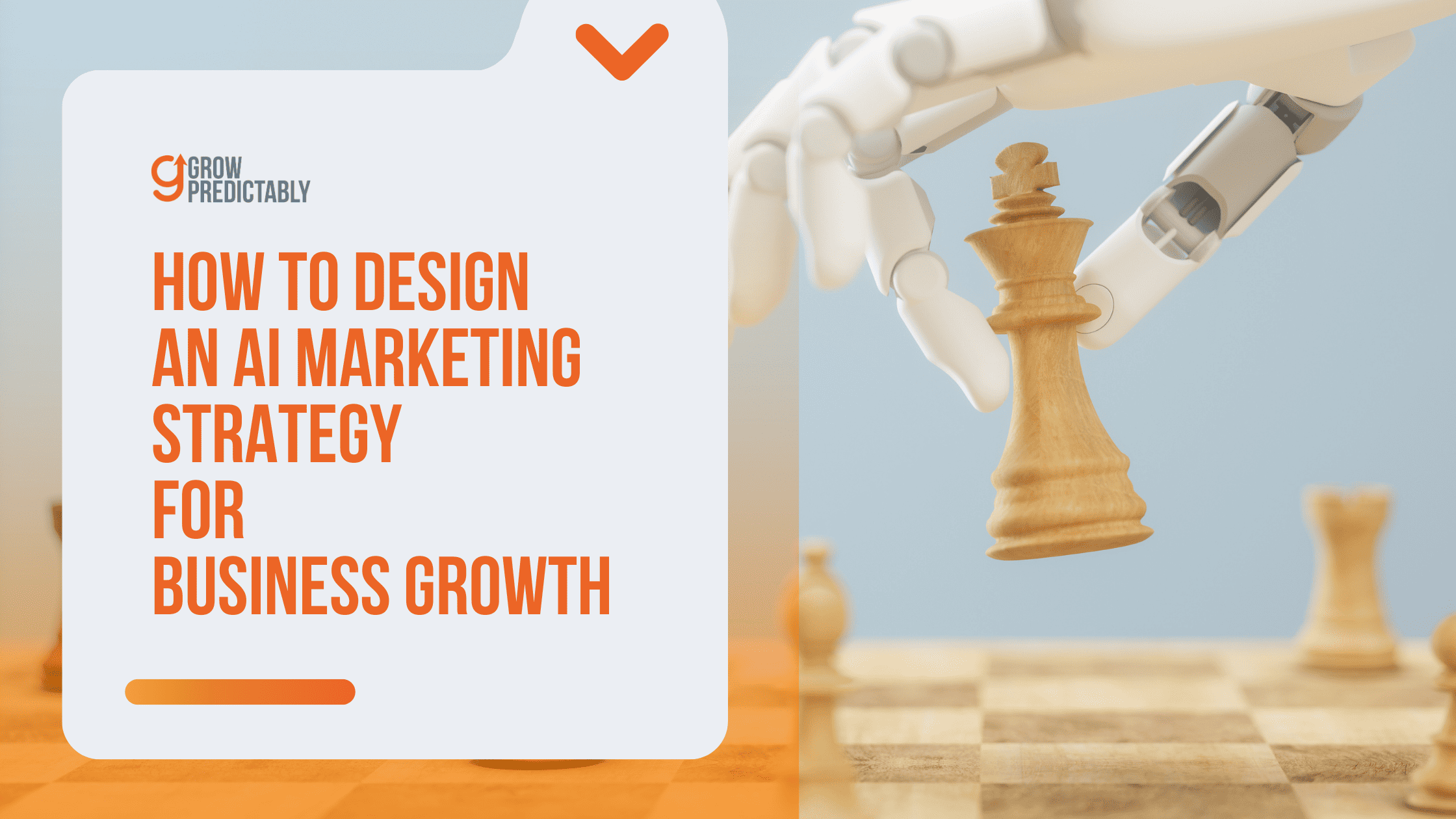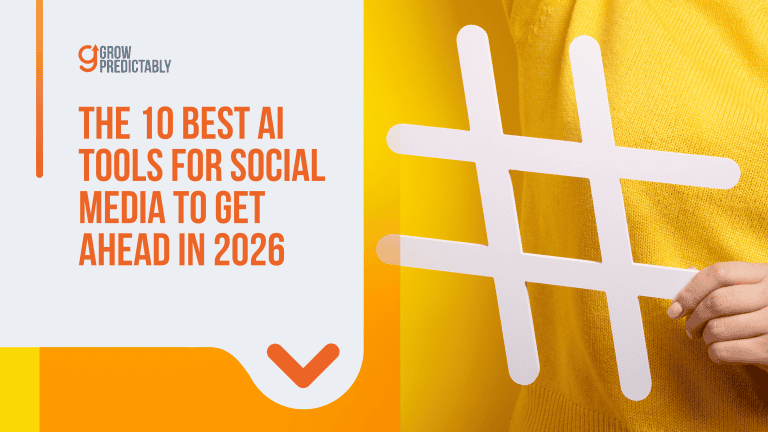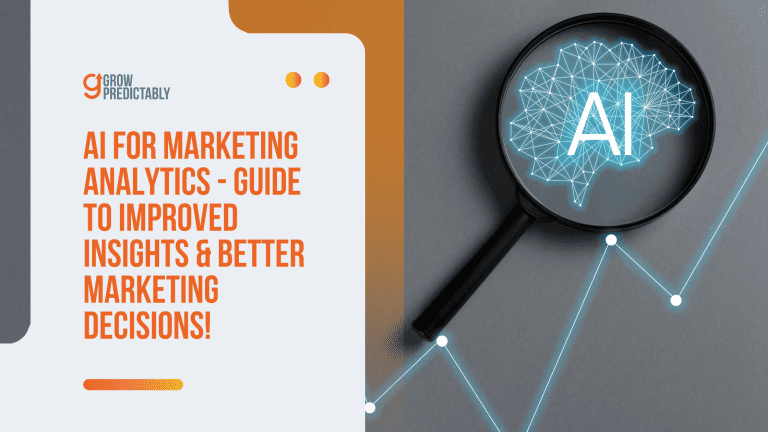How to Design an AI Marketing Strategy for Business Growth
Are you looking for a new way to unlock business growth? Have you wanted to give your marketing efforts an edge and expand your customer base but aren’t sure how?
The answer may be closer than you think – AI marketing.
AI marketing can help take the guesswork out of creating valuable customer experiences that keep them engaged with your products or services and offer long-term, sustainable results.
Today, we will uncover how AI fundamentally changes how businesses approach their marketing strategies.
It will also show why investing in the right AI marketing tools and tactics could be the key to unlocking success.
We’ll look at each step of a successful AI marketing strategy using the framework: a documented customer journey, actionable metrics, and targeted tools/tactics, exploring real techniques marketers can use to benefit from this cutting-edge technology today!
So, if you’re ready to embrace artificial intelligence to improve marketing ROI, business growth, and more now instead of later – read on!
The Impact of AI on Marketing Strategies
As the illustrious marketing visionary Ryan Deiss once said, “It’s not about getting your customer to say ‘yes,’ it’s about getting your customer to say ‘yes’ faster.”
The rapid development of artificial intelligence technology is revolutionizing the marketing world.
This alters how companies strategize and engage with their target audiences using AI tools and how they integrate their marketing teams and marketing campaigns with such tools.
As we venture further into the age of digitalization, it is essential to recognize the growing influence of AI on marketing campaigns and the immense potential for growth and success it presents.

Smart algorithms enable marketers to collect and analyze vast amounts of data with unprecedented precision.
Thanks to AI tools, this also allows them to personalize content, improve customer experience, and predict trends with incredible accuracy from just a few years ago.
As such, AI marketing tools offer businesses the opportunity to stay competitive, innovative, and relevant in an increasingly technology-driven landscape, ultimately granting them the ability to forge stronger, more meaningful connections with their customers while boosting their bottom line.
4 Major Areas That Improve with AI in Marketing
The marketing landscape has been shifting rapidly, with Artificial Intelligence (AI) spearheading the charge toward unearthing revolutionary strategies and technologies.
As marketing processes and marketing teams continue to advance, AI triumphantly rises to the challenge, assisting marketers in comprehending the various metrics and data points intrinsic to the success of their marketing campaigns.
With AI in the driver’s seat, marketers can effortlessly identify and target the right prospects, tailor their messaging to individual consumer preferences, and drive conversion rates to new heights.
Furthermore, consumer behavior analysis becomes infinitely more accessible, allowing for real-time, data-driven decision-making that propels businesses forward in today’s intensely competitive marketplace.
Indeed, the significance of AI in marketing is undeniable, heralding a new era of precision, personalization, and performance optimization that will indubitably shape the industry’s future through AI tools.
1. Improved Customer Insights and Personalization
Imagine a world where you could understand your customers better than they understand themselves.
In today’s rapidly changing and competitive business environment, improving customer insights and personalization can be the ultimate game-changer for marketing teams.
Understanding customers’ needs, preferences, and behavior can pave the way for creating tailor-made experiences that enhance customer satisfaction and boost long-term loyalty.
Embracing modern data analytics and machine learning techniques can provide actionable insights, helping you make informed decisions while creating a seamless and personalized customer journey.

2. Enhanced Efficiency in Marketing Processes
The ability to communicate effectively with your target audience and tailor promotional strategies to suit their preferences can impact your bottom line.
In addition, you can streamline your initiatives by leveraging artificial intelligence in your marketing operations with the use of the right AI marketing tool.
Savvy marketers understand that implementing machine learning, clever automation, and personalization techniques can make all the difference, and they continuously seek to optimize their campaigns through meticulous experimentation and testing.
As a result, businesses worldwide are making great strides in customer acquisition and retention.
So think about how the right blend of AI marketing tools, innovation, and efficiency can propel your company into the future, turning it into a true industry leader!
3. Better ROI on Marketing Investments
The quest for a better ROI on marketing investments is a top priority for businesses of all sizes. And integrating AI tools into your marketing teams is an example of that.
By vetting for the perfect AI marketing tool for your business and implementing the right strategies and tactics, you’ll be able to maximize your marketing dollars while driving impressive results.
Focus on data-driven decisions, targeted messaging, and thoughtful user experiences to create a winning combination that produces measurable success.
When executions are tailored to your customer’s unique needs and behavior, you’ll witness the power of truly compelling marketing and reap the benefits of an improved ROI.

4. Competitive Advantage in the Market
Achieving a competitive advantage in today’s dynamic market can often distinguish your organization from others, jostling for the same customer base.
However, to effectively rise above the noise of competition, businesses must be strategic, constantly analyzing industry trends and understanding their strengths and weaknesses relative to the market.
Companies like Apple, Google, and Amazon have solidified their market dominance through continuous innovation, exceptional customer service, and savvy marketing.
One crucial element of securing a competitive advantage involves leveraging modern technology – the right AI marketing tool to power your marketing teams.
Doing so can bring data-driven insights that streamline your processes, enhance offerings, and predict customer needs.
Integrating these factors into your organization’s overall strategy can lead to long-term success and market leadership.
Investing time and resources to fortify your competitive advantage secures your current position and ensures future growth and profitability (without being spammy).
3 Key Components of an AI Marketing Strategy
In today’s rapidly evolving digital landscape, staying ahead of the curve is essential to incorporating artificial intelligence into your marketing.
The key components of a successful AI-driven marketing plan involve harnessing the power of machine learning, algorithms, and data analytics to elevate your campaigns and customer engagements.
One of the primary objectives is to implement AI to refine your target audience’s understanding, enabling hyper-personalization in your communication impact marketing efforts.
By leveraging predictive analytics and machine learning, you can fine-tune your content and offers based on individual preferences, behaviors, and purchasing patterns.
Moreover, integrating AI-powered chatbots and virtual assistants into your marketing approach allows for enhanced real-time interaction with customers, improving their overall experience.
With AI at the core of your marketing, you can become more agile and responsive, ultimately generating higher returns on investment and fostering stronger bonds with your demographic.
1. Data Collection and Analysis
Data collection and analysis are integral to decision-making in today’s fast-paced world. The ability to gather, scrutinize, and draw valuable insights from large volumes of data has revolutionized how businesses and marketing teams operate.
However, it’s not just about having access to vast amounts of data; it is about using the right AI marketing tools and techniques to analyze all that data and uncover hidden patterns or trends.

When executed effectively, data analysis can lead to better targeting of marketing efforts, more efficient use of resources, and the ability to make well-informed decisions that drive growth and success.
Empowering companies to stay competitive, a robust data-driven approach has become a game-changer, paving the way for innovative marketing strategies, smarter solutions, and a brighter future.
Utilizing AI-Driven Tools for Gathering Customer Data
Imagine unlocking the secret to your customers’ thoughts, desires, and behaviors as if you could read their minds – this is now possible through AI marketing tools for gathering customer data.
With the power of artificial intelligence, businesses can transform how they engage with their customers, enabling them to provide highly personalized experiences that are both engaging and impactful.
By tapping into the vast amounts of data generated by consumers on a daily basis, AI marketing tools provide invaluable insights that empower businesses to understand their customer’s behavior, preferences, and pain points like never before.
The result is a strategic and highly targeted approach to customer interaction and marketing that drives growth and cultivates long-lasting relationships.
Analyzing Customer Behavior Patterns
Diving into the intricacies of customer behavior patterns is common to successful marketing teams. It allows businesses to understand their target audiences and cater to their specific needs more effectively.
By analyzing these patterns, insightful trends can be identified, enabling marketers to forecast customer preferences and tailor their offerings accordingly. This can lead to higher customer satisfaction, increased loyalty, and a more fruitful bottom line for the business.
In this ever-evolving world of consumer needs and preferences, an in-depth understanding of customer behavior patterns is a valuable asset that grants businesses a significant competitive edge, paving the way for continuous growth and success.
Identifying Key Target Segments
As any marketing expert will confirm, the cornerstone of an effective marketing campaign is accurately identifying your key target segments. This vital process, done at the outset, can make or break a few challenges to your overall marketing strategy.
To accomplish this, you must dive deep into your target audience – understanding their demographics, behavior patterns, preferences, and emotional triggers.
Once you’ve analyzed this valuable data, you’ll be miles ahead of the competition and capable of creating tailor-made marketing messages and offers that resonate with your intended audience.
Moreover, by segmenting your audience into key target groups, you can allocate your marketing resources more efficiently and receive a higher return on investment, ultimately achieving the growth and success you’re striving for.
2. AI-Powered Content Creation and Optimization
Innovative Artificial Intelligence (AI) advancements have become increasingly valuable in content creation and optimization as we progress into a more technologically driven world.
Harnessing AI’s power revolutionizes how we curate and disseminate information, streamlining the process to yield effective, targeted content that resonates with its intended audience.
From natural language processing to machine learning, AI-powered content creators can analyze immense amounts of data and identify emerging trends and patterns, refining their strategies to generate high-quality, engaging content that not only meets but exceeds expectations.
Ultimately, by embracing the cutting-edge capabilities of AI technologies, businesses and individuals alike can elevate their content marketing game, outpacing competitors while captivating and retaining users in the digital age.
Generating Personalized Content
Generating personalized content has never been more critical to building lasting relationships with your audience; after all, who doesn’t love a VIP experience tailored just for them?
With the right AI marketing tools and strategies, you can make your users feel seen and understood, elevating your brand to new heights. Creating content that resonates with each person’s unique preferences, interests, and behaviors in this digital age fosters increased engagement and loyalty and sets your brand apart from the competition.
The beauty of today’s technology is that it empowers businesses to glean invaluable insights from data, enabling them to serve up content that genuinely captures their audience’s attention, seals their interest, and turns them into long-term advocates for your brand.
Remember, the key to winning hearts and minds in the crowded online space lies in crafting bespoke experiences – because that’s when the magic happens.
Optimizing Content for Search Engines and User Engagement
Optimizing content for search engines and user engagement is the holy grail of digital marketing, and it shouldn’t feel like you’re performing some dark magic.
It’s all about achieving that perfect balance between appealing to algorithms and human beings. As a content creator, your goal should be to develop captivating, authoritative, and informative material that reels your audience and keeps them hooked.
A strategic approach to content optimization includes using relevant keywords, incorporating captivating images, and crafting killer headlines that entice users to click.
As you delve deeper into the art of content optimization, remember it’s not about stuffing keywords or pandering to search engines. Ultimately, it’s about providing your audience the value they seek.
So focus on delighting your users by creating genuinely useful and remarkable content because when your users are engaged, search engines will take notice, too.
3. AI-Driven Marketing Automation
Imagine a world where your marketing campaigns run effortlessly, reaching your target audience with precision and personalization and providing a notable return on investment.
This is no mere fantasy in many marketing teams today – it’s the reality of AI-driven marketing automation.
By harnessing the power of artificial intelligence, marketing teams and experts are revolutionizing the game with unprecedented efficiency and effectiveness.
Intelligent algorithms analyze consumer behavior and preferences, allowing businesses to craft personalized messaging that resonates with their audiences while also predicting the success of marketing efforts.
In addition, AI can determine the best marketing channels and ideal times to reach your customers, resulting in improved engagement rates and, ultimately, increased revenue.
Join the ranks of marketing aficionados and experience the transformative effects of AI-driven automation – the ultimate weapon in your digital marketing arsenal.
Implementing AI-Powered Email Marketing Campaigns
Embracing the power of AI-driven email marketing campaigns can revolutionize how we connect with our audience, transforming our communication strategies and driving unprecedented growth.
Artificial intelligence offers exciting prospects for automating email personalization, customer segmentation, and data analysis, thereby freeing up more room for creative, strategic thinking. It allows marketers to delve deeper into consumer behavior by analyzing intricate patterns and predicting future trends.
AI-powered email marketing campaigns pave the way for captivating, highly effective content that resonates with recipients on a more personal and targeted level.
By leveraging this cutting-edge technology, brands can enhance customer relationships, maximize engagement, and ultimately skyrocket their ROI.
With industry leaders like Ryan Deiss at the forefront of such advancements, the future of email marketing has never looked brighter. So, it’s time to embrace AI-driven automation and unlock your company’s full potential.
Automating Social Media Posting and Engagement
Imagine a world where your social media tactics thrive without the constant need for attention, where you can maintain consistency and grow your online brand effortlessly.
This dream can quickly turn into a reality by automating social media posting and engagement. Harness the power of technology to ensure your key messages reach the right audiences at the right time, leaving you with more time to focus on strategic business goals.
Automation marketing tools like Buffer and Hootsuite allow you to schedule your posts in advance and analyze their performance in real time.
Moreover, incorporating artificial intelligence and chatbots enables you to provide a personalized experience for your audience while maintaining a human touch.
Stay ahead of the curve and embrace the future of social media marketing by diving headfirst into the world of automation. The results will astound you, and your customers will thank you!
Leveraging Chatbots for Customer Support and Lead Generation
Customer support and lead generation are essential components for businesses to succeed, and leveraging chatbots is revolutionizing how these components are utilized.
Imagine an efficient and responsive automated tool that can handle customer inquiries round-the-clock, intelligently engage them, and generate leads with tailored solutions.
Chatbots have emerged as an innovative, time-saving, and cost-effective option that can effectively interact and engage with customers, understand their preferences, and help businesses build better relationships.
The result is an enhanced user experience, higher customer satisfaction, and a boost in conversions. Incorporating chatbots in your customer support and lead generation strategy is a game-changer that enables your business to stay ahead of the competition and achieve phenomenal growth.
3 Ways to Integrate AI into the Customer Value Journey
As we venture into the digital age, integrating Artificial Intelligence (AI) into the Customer Value Journey becomes increasingly essential for businesses to thrive.
Ryan Deiss emphasizes the importance of utilizing cutting-edge AI technology to capture, acquire, and retain customers at every touchpoint.
In doing so, businesses can consistently optimize and enhance their customer experiences, leading to increased satisfaction and loyalty. This, in turn, translates to a boost in revenue and long-term business growth.
With AI automating various aspects of the customer journey, from personalized recommendations to virtual assistance and sentiment analysis, businesses can now attain remarkable efficiency and effectiveness.
By adopting these strategies, companies can remain competitive and relevant, carving their path to success in an ever-evolving market landscape.
AI-Enhanced Customer Journey Mapping
Imagine stepping into the future of customer experience with cutting-edge technology designed to fully understand your customers, anticipate their needs, and create unparalleled interactions.
AI-enhanced customer journey mapping is revolutionizing how businesses connect with their audience, ensuring no touchpoint is left unoptimized.
By leveraging the power of artificial intelligence, this innovative approach dives deep into customer data, enabling you to identify trends, uncover opportunities, and foster meaningful relationships that boost satisfaction and loyalty.
Think of it as having a dedicated, data-driven expert in your corner, empowering you to meet and even exceed your customers’ expectations.
In a world where competition grows fiercer by the day, embracing AI-enhanced customer journey mapping is the key to staying ahead, fostering long-term customer delight, and driving your business toward unprecedented success.
Identifying Bottlenecks and Opportunities for Optimization
Identifying bottlenecks and opportunities for optimization is crucial in achieving business success and creating a seamless flow of operations.
With a strategic and analytical approach, you can unlock your organization’s full potential and outpace your competitors. It begins with a careful evaluation of your existing processes, pinpointing areas where progress may be hampered, or resources are misallocated.
Once you’ve identified these bottlenecks, you can effectively implement solutions that streamline your operations and reveal new optimization opportunities.
Prioritizing this essential process will propel your business forward and propel you into a new era of innovative growth and sustained success.
Streamlining the Customer Journey with AI Marketing Tools
As businesses evolve in the digital age, streamlining the customer journey has become vital of maintaining a competitive advantage.
Leveraging the technological prowess of AI marketing tools, companies are able to craft a more engaging, personalized, and informative experience for their audience.
By employing AI, businesses can effectively analyze customer data, helping them anticipate the needs of their users and connect them with the most relevant content quickly and efficiently.
This elevated, intuitive user experience leads to more satisfied customers, increased brand loyalty, and improved conversion rates.
By prioritizing implementing AI technologies in your customer journey strategy, you’ll harness the full potential of these cutting-edge tools to meet and exceed the expectations of today’s rapidly evolving consumers.
AI-Driven Growth Scorecards
AI-driven growth scorecards revolutionize how businesses evaluate their performance and make informed decisions. No longer are we constrained by static metrics and gut instincts; instead, we’re entering a new age of dynamic, data-driven analysis.
By harnessing the power of artificial intelligence, organizations can now analyze vast amounts of data in real time, allowing for a comprehensive understanding of their growth trajectory.
Their ability to adapt and learn sets AI growth scorecards apart, constantly refining and improving their insights as they ingest new information.
In the era of Industry 4.0, this groundbreaking tool offers unparalleled support for executives and decision-makers, arming them with the actionable knowledge they need to confidently steer their organizations towards a prosperous future.
Tracking Metrics Across Each Stage of the Customer Journey
Understanding and optimizing the customer journey is crucial to the growth and success of any business.
Tracking metrics across each customer journey stage provides invaluable insights into the most effective ways to engage with your target audience, ensuring you deliver the right content and experiences that ultimately lead to conversions and satisfied customers.
By identifying key touchpoints and assessing valuable data such as conversion rates, bounce rates, and average time spent on site, you’re positioning your business to make informed decisions to improve communication efforts and drive meaningful results.
Don’t leave your customers’ satisfaction to chance; become a master of the customer journey by closely monitoring metrics tied to success.
Utilizing AI to Predict Customer Behavior and Optimize Campaigns
The opportunities presented by AI-powered predictions of customer behavior are truly revolutionizing the marketing landscape in a multitude of ways.
For businesses seeking to optimize their campaigns and tap into consumer preferences, artificial intelligence offers unparalleled accuracy by analyzing vast pools of data on customer interactions, past purchase decisions, and real-time online behavior.
Through AI’s comprehensive understanding of customer inclinations, marketers can craft compelling campaigns that effectively engage current and potential customers with personalized messaging and tempting offers.
Many digital marketers are already reaping the rewards of this cutting-edge technology, experiencing an increase in conversions, enhanced customer loyalty, and long-term business success.
AI-Based Tools and Tactics for Growth
Customer journey mapping is the foundation of growth. By leveraging AI marketing tools and tactics, businesses can identify customer pain points more accurately, develop strategies to engage efficiently, and deliver predictable results.
Today’s technology allows for contextualized feedback loops geared towards continuously optimizing customer engagement—ensuring customers get relevant content at the right time and place along their journey.
The combination of customer journey mapping powered by AI-based tools and tactics allows your business to anticipate consumer needs before they even occur; this kind of proactive awareness has allowed businesses to experience exponential success within a short time.
Personalizing Marketing Strategies Based on Customer Data
Imagine the power of tailoring your marketing strategies to each individual customer based on their unique data and preferences.
This level of personalization elevates your marketing from generic ads to targeted, personalized messages that resonate with your audience, creating a powerful bond between your brand and your customers.
By combing through an abundance of customer data, machine learning, and using smart algorithms, you can identify the profiles and behavior patterns that lead to conversion and loyalty, helping you make informed decisions on how to customize your content, offers, and promotions.
These insights pave the way to increase revenue and customer retention and attract new prospects intrigued by a more personalized, valuable experience.
The days of one-size-fits-all marketing are gone, and it’s time for businesses to embrace the future where relevant, tailored interaction is king.
Continuously Optimizing Campaigns Using AI Insights
When achieving maximum results in today’s fast-paced and competitive marketing landscape, continuously optimizing campaigns using AI insights stands at the forefront of innovative strategies.
Artificial intelligence, with its massive potential for data analysis and pattern recognition, has revolutionized how we approach, manage, and optimize our marketing campaigns by providing invaluable information about consumer behavior, preferences, and trends.
As a marketer, leveraging the power of AI empowers you to strategically adjust your messaging, targeting, and overall campaign to ensure that you consistently engage with the right audience and drive toward desired results.
With continuous optimization at its core, AI-driven marketing enables agility and adaptability, making way for constantly evolving and improving campaigns that thoroughly align with the ever-changing digital landscape.
Case Studies on Successful AI Marketing Implementation
Businesses are increasingly turning to AI-driven marketing to help them optimize their campaigns.
To better understand how this technology can be used for success, it’s helpful to look at real-life case studies of companies that have successfully implemented an AI marketing strategy.
Examining marketing leaders and their tactics can provide insight into the best practices and potential challenges of implementing a practical AI marketing approach.
Examples of Companies Leveraging AI for Marketing Success
The power and potential of Artificial Intelligence (AI) in marketing are astonishing, and many companies are already illustrating how this advanced technology is driving their success.
Take Netflix, for example, which significantly boosts viewer satisfaction and retention by employing powerful AI algorithms to tailor their content offerings based on individual viewing patterns.
Or consider Coca-Cola, a brand that utilizes powerful machine learning tools to personalize customer interactions through social media platforms, listening capabilities, and chatbot technology.
As Ryan Deiss — a prominent expert in the field — has highlighted, the key to marketing success is connecting with customers personally. AI is rapidly becoming a game-changing marketing tool used to forge these connections on an unprecedented scale.
Key Lessons Learned from These Case Studies
Delving into case studies can give us key insights and valuable perspectives in various fields. By following the examples of industry leaders like Netflix and Coca-Cola, forward-thinking marketers can leverage AI to identify and target their key audiences more efficiently and resonate with them in meaningful and memorable ways.
This exploration enables us to create a comprehensive roadmap for decision-making, allowing us to approach challenges with an arsenal of knowledge and experience.
Furthermore, case studies serve as a powerful reminder of the importance of learning from our predecessors and fostering a culture of continuous improvement and growth in our personal and professional lives.
As we reflect upon these findings, we become better equipped to face the complexities of today’s ever-changing world, empowered by the collective wisdom garnered from these illuminative investigations.
3 Considerations for AI Marketing Implementation
The implementation of an AI marketing strategy undeniably brings an array of challenges and considerations that businesses must earnestly address.
AI’s potency lies in its ability to harness the power of data and generate insights that can fundamentally transform marketing campaigns. However, this technology lacks potential risks and quandaries, which savvy marketers must evaluate.
1. Data Privacy Concerns
Data privacy has become essential to our daily lives as technological advancements transform how we interact, communicate, and share information.
While these technological innovations have undeniably made our lives more convenient, they have also raised a myriad of concerns regarding the nature and extent of user data that is now vulnerable to misuse.
Data privacy concerns have garnered the attention of the masses, urging individuals and businesses alike to take action to protect sensitive personal and financial information.
As the digital landscape evolves, society must be aware of the potential risks associated with data breaches, and it’s more important now than ever for companies to prioritize safeguarding their customers’ data, adhering to strict privacy laws and best practices.
Educating ourselves about these concerns and actively participating in the conversation can help shape a more secure digital future for everyone.
2. Balancing AI Automation with Human Creativity
Integrating AI automation and human creativity is drastically transforming the workforce landscape. As business leaders, we are responsible for striking the perfect balance between technological advancements and human ingenuity.
This harmonious union enables us to harness AI’s computational prowess while celebrating and encouraging the innovative spirit that humans inherently possess.
This collaborative approach unleashes new opportunities for growth and success as we blend the power of artificial intelligence to streamline processes and enhance productivity with the unbridled creative potential of the human mind.
When we empower our teams to develop groundbreaking ideas and solutions, we simultaneously facilitate AI’s role in bringing these ideas to fruition, effectively establishing an ecosystem where both forces work symbiotically to drive continued progress and prosperity.
It is this marriage of AI automation and human creativity where the true magic lies – in the boundless realm of possibility where our collective intelligence converges, paving the way for the extraordinary achievements of tomorrow.
3. Ensuring Ethical AI Use in Marketing
The rise of artificial intelligence (AI) has brought about significant advancements in the marketing field, but along with these advancements comes the responsibility to ensure ethical AI use.
As marketers striving for excellence, we must embrace the power of AI in our campaigns while upholding the trust of our customers and safeguarding their privacy.
We must be diligent in being transparent with our data usage, selecting only reliable and unbiased AI marketing tools, and continuously evaluating the impact of our AI-driven marketing strategies.
This ethical approach to AI-driven marketing maintains customer confidence and loyalty and drives better results for our businesses in the long run. So, let’s champion responsible AI use for a brighter and more human-centric marketing future.
3 Steps to Begin Implementing an AI Marketing Strategy
Embarking on the journey to implement an AI marketing strategy can be a game-changing decision for your business. That’s why it’s crucial to understand the initial steps needed to ensure success.
- Identify your business goals
- Provide your team with education and training on AI marketing
- Choose the right technology partners
- Identifying your goals – understanding your business’s pain points and how AI can help address them. Next, it’s important to analyze your data sources and ensure they’re organized, as this will provide the foundation for your AI-based marketing insights.
- Onboard your team – this involves educating them on AI’s potential and providing them with essential training. A crucial aspect here is fostering a culture of experimentation and learning, allowing your team to test new ideas in implementing AI solutions.
- Choose the right technology partners – this step is critical since it helps ensure you have a strong base to build on and can explore the benefits of AI marketing smoothly and hassle-free.
By following these steps, you’ll be well on your way to revolutionizing your strategy through AI.
FAQs
Conclusion
Embracing the future of marketing with AI is not only strategically wise, but it’s also a game-changer in the rapidly evolving digital landscape.
As an industry influencer like Ryan Deiss would attest, AI-backed marketing strategies empower businesses to enhance their customer experiences through personalized interactions and data-driven insights.
This cutting-edge approach enables marketers to optimize campaigns in real-time, efficiently allocate resources, and ultimately, boost ROI. By leveraging AI, businesses have access to predictive marketing tools that identify trends and potential customer behaviors, empowering them to innovate ahead of their competition.
The time is now for businesses to adapt and invest in AI-driven marketing solutions, ensuring they maintain a competitive edge as the marketing world continues to advance at breakneck speeds.




![7 Best AI Story Generators in 2026 for Your Next Story [Ranked]](https://growpredictably.com/wp-content/uploads/2023/12/AI-Story-Generators--768x432.png)



